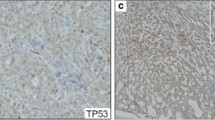Abstract.
The tumor-suppressor protein p53 has recently been shown to belong to a family that includes two structurally related proteins, p63 and p73. In contrast to p53, p63 and p73 play an essential role in epithelial development, stem cell identity and cellular differentiation. Salivary gland tumors carry a wide spectrum of histopathological forms, which may share a common single-cell origin from the epithelial progenitor basal duct cells and have a different tendency of malignant progression. This study was performed to examine the expression of p53, p63, and p73 in benign salivary gland tumors. Expression and mutation of p53, p73, and p63 were examined by direct DNA sequencing, reverse transcription PCR using isoform-specific primers, and by immunohistochemistry in normal parotid tissue (n=10), and various tumors of the salivary gland (42 pleomorphic adenomas, 12 myoepitheliomas, 8 basal cell adenomas, 5 oncocytomas, 5 canalicular adenomas, and 20 adenolymphomas). In normal parotid tissue the expression of p63 and p73 was restricted to few basal and myoepithelial cells. Ductal luminal and acinus cells were completely negative for the expression of all three family members. In contrast, in salivary gland tumors, strong nuclear staining for p63 and p73 was observed. Myoepithelial and basaloid cells and the basal epithelial layer of adenolyphomas and oncocytomas were positive for p63 and also, to a lesser extent, to p73. Mutations of p53 were detected in 4 of 42 (10%) pleomorphic adenomas, in 3 of 12 (25%) myoepitheliomas, and in 1 of 8 (13%) basal cell adenomas but not in other tumors. We failed to detect specific mutations of p63 and p73. Using isoform-specific PCR, we found that all isoforms of p63 were expressed in normal parotid tissue whereas the pleomorphic adenomas, myoepitehliomas, and basal cell adenomas dominantly expressed the transactivation-incompetent truncated isoforms. Our data indicate that p63 and p73 are upregulated in salivary gland tumors and may serve as a marker of epithelial and myoepithelial progenitor cells in salivary glands. The prevalence of p53 mutations and the observation of the expression of ΔNp63 isoforms only in pleomorphic adenomas, myoepitheliomas, and also basal cell adenomas may reflect their possible malignant potential.
Similar content being viewed by others
Author information
Authors and Affiliations
Additional information
Electronic Publication
Rights and permissions
About this article
Cite this article
Weber, A., Langhanki, L., Schütz, A. et al. Expression profiles of p53, p63, and p73 in benign salivary gland tumors. Virchows Arch 441, 428–436 (2002). https://doi.org/10.1007/s00428-002-0705-y
Received:
Accepted:
Issue Date:
DOI: https://doi.org/10.1007/s00428-002-0705-y




